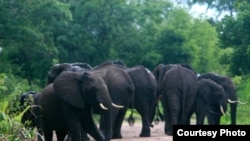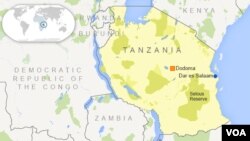A new report accuses members of Chinese President Xi Jinping’s entourage on a state trip to Tanzania last year of loading an official plane with illegal ivory.
The report released Thursday by the Environmental Investigation Agency, a London-based international nonprofit, said members of the Chinese delegation bought so much ivory on the March 2013 trip that prices for the illegal commodity doubled up to $700 per kilogram.
A spokesman in Beijing said Thursday the charge that illegal ivory was carried out of Africa by a Chinese government airliner is "groundless."
The illegal ivory trade has devastated elephant populations in the East African nation.
Local traders, quoted in the report, said the contraband was allegedly bundled up and flown back to China on the presidential plane.
A video record
In a video released by the environmental agency, an alleged Tanzanian ivory dealer discusses the Chinese deals with an undercover investigator.
The unnamed trader said when Xi’s entourage visited, “Many kilos go out, many kilos.* Half of his plane goes to that business.”
When an investigator asked how he knew, the trader responded: “I know. They buy from us.”
The report added that Chinese diplomatic and military staffs, along with Chinese businessmen, in the past have used such visits to purchase large amounts of ivory.
Illicit Trade in Ivory Tusks
Illicit Trade in Ivory Tusks
The Environmental Investigation Agency, an international organization, reports:
- Tanzania has become the largest supplier of poached ivory.
- Tanzania recently has lost more elephants to poaching than any other country. In 2013, it lost 10,000 – or 27 a day.
- China is the largest importer of poached ivory.
- Chinese prize ivory for decorative and medicinal value.
- Because of its scarcity, ivory also is an investment commodity.
Sources: EIA and Associated Press
China has not responded to the accusations, but it previously has said it is doing all it can to prevent illegal wildlife poaching.
China has vowed to crack down on ivory trafficking. In a ceremony in the city of Guangzhou in January, officials crushed more than 6 tons of confiscated raw and carved ivory to show their commitment.
The event was attended by representatives of African countries hit hard by poaching, including Tanzania.
A dubious distinction
The report said Tanzania is the biggest source of illegal ivory seized around the world.
International ivory trading was banned in the 1980s in an effort to protect elephants, tens of thousands of whom are killed by poachers each year for their tusks.
The Convention on International Trade in Endangered Species last year named China among eight nations failing to do enough to fight the import of illegally smuggled ivory.
Tanzania is a close ally of China. On a visit to Beijing last month, President Jakaya Kikwete signed business deals reported to be worth $1.7 billion.
Trafficking follows established trade routes in Tanzania, beginning in the country's own wildlife reserves.
Elephants are slaughtered at the parks – Selous, a reserve in southern Tanzania, is one of the hardest hit. The ivory is collected in villages and brought to the port in Dar es Salaam, Tanzania’s capital. It is loaded onto freighters and shipped to destinations in Asia, including Hong Kong, Manila and Haiphong, Vietnam, before ending up in China, where it is cut, carved and sold as decoration or used in medicine.
Who is involved?
None of this would be possible without the cooperation of Tanzanian authorities, said Shruti Suresh, an EIA wildlife campaigner.
"Seeing that there are several tons of ivory going through government posts, past government officials, it is clear that this corruption permeates through the highest levels of government," Suresh said.
The insatiable demand for ivory, mostly from Asia, has had devastating consequences for elephant populations.
The environmental agency said Tanzania had lost two-thirds of its elephants in less than a decade, mostly to poachers. The country had 142,000 elephants in 2005; the agency predicted that, at the current death rate, the number would fall to about 55,000 in 2015. The elephant population at the Selous reserve alone fell from 70,000 in 2006 to just 13,000 in 2013.
Suresh called the decline of Tanzania’s elephant population "dire in the extreme."
"It's quite shocking," Suresh said. "And if we don't stop this rate of decline, we really don't know if Tanzania will have elephants in the near future."
* The original version of this report erroneously quoted the unnamed trader as as putting the amount of ivory at 90 kilos. VOA regrets the error.














